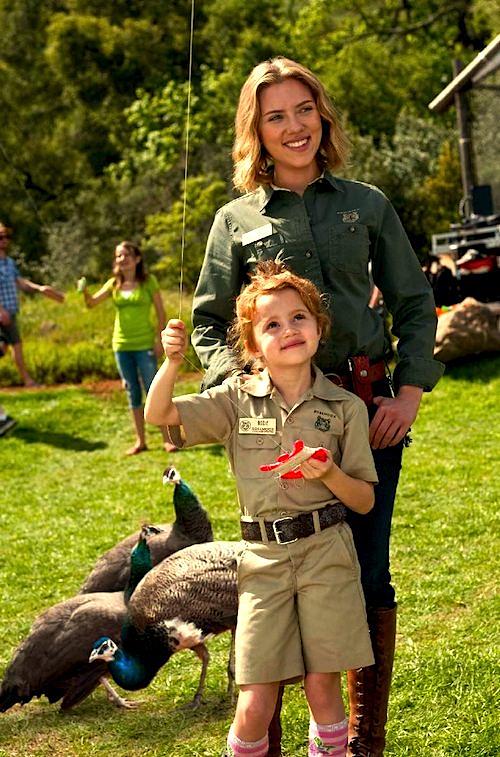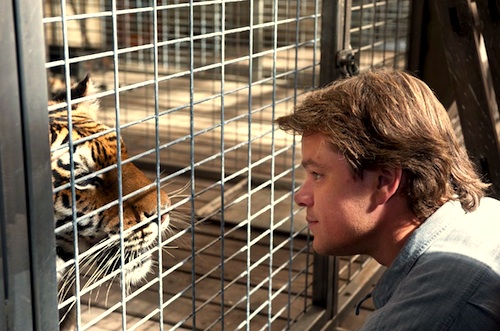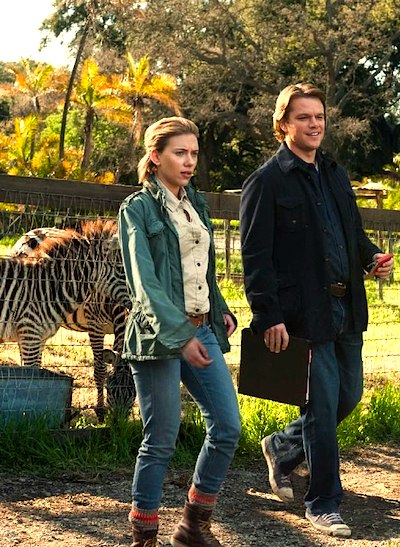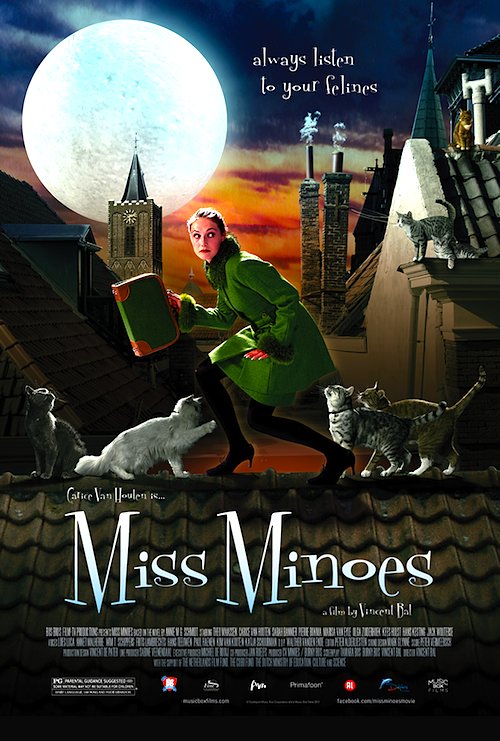
By David Ross. THE PITCH: Grieving widower (Matt Damon) purchases and restores a ramshackle zoo. Surly teenage son and adorable moppet of a daughter work out psychological trauma of mom’s death, while lovable band of zookeeper misfits provides comic relief and romantic opportunity (Scarlett Johansson).
THE SKINNY: Having to choose this holiday season between a weepy Matt Damon and a gaggle of wise-ass cartoon chipmunks, I reluctantly choose the former. The group-therapy dynamic is gluey and interminable, but I don’t mind watching Scarlett Johansson lug buckets of raw meat in a zookeeper’s jumpsuit. Kids will of course enjoy the animals.
WHAT WORKS: • There are a few veiled penis jokes and booze references, and the above-mentioned moppet does use the word ‘d**k’ (they don’t make moppets the way they used to), but for the most part moms will not have to lunge in human earmuff mode.
• Matt Damon is a Hollywood packhorse; plodding along, he gets the job done, whatever the film, whatever the genre. What I take to be his genuine intelligence and good nature shine through. More than ever, he’s oddly rectangular, as if he’s made of Lego or gingerbread. The obvious analogy is to Spencer Tracy, another squat savior of otherwise mediocre films.
• Scarlett Johansson’s potbelly is long gone. Svelte and tomboyish only in quotation marks, she’s a little hard to believe in the role of zoo drudge. She’s become very good at conspiring in this kind of narrative hypocrisy. It’s not the flaunters who drive you crazy; it’s the figurative librarians in their figurative cardigans. Scarlett’s cardigan consists of her shyness and her husky voice and her imperfect features. We’re eventually blindsided by the realization of our initial error. Scarlett is such a fizzle as a model (Dolce and Gabbana) because none of this works in the context of negligee and deliberate smolder.
• The film’s only bad guy is a priggish little zoo inspector who wields his measuring tape like a sadist’s whip. The film is not trying to make a political point, but all the same it effectively silhouettes the state regulatory apparatus in its fascist aspect. Damon’s zoo owner must grovel and beg for permission to operate his business, all his dreams (not to mention his life savings) hinging on the whim of a petty bureaucrat. Matt Damon, this is what you vote for and would have us vote for! Learn a thing or two from your own movie.

WHAT DOESN’T WORK: • The dwindling imagination of Hollywood can conceive of only two dramatic premises at this point: dead spouse or dead kid. The actuarial chance of a woman dying in the prime of life is one in many thousands; the actuarial chance of a woman dying in the prime of life in the average Hollywood ‘drama’ is about 50%. In a ‘supernatural thriller,’ the odds are 100%. If cancer doesn’t get her, then a wet road at night certainly will. The husband will have had a few drinks and must therefore ‘learn to forgive himself.’ This scenario is catnap to reviewers like Kenneth Turan, who know ‘surprising psychological complexity’ when they see it. I, for one, am tired of being subjected to this ghoulish graveyardism. No more flashbacks of picnics in fields strewn with spring flowers! No more wrinkled wallet photos and beery viewings of old home movies! No more bedtime attempts to explain what happened to mommy’s soul while scrupulously avoiding the specifics of Christian theology!
• Likewise, I’m sick of surly teenagers. I’m sure they exist. I’m sure they secretly yearn to stop sniffing glue and torturing cats and to be told how much they’re loved by their gruff but well-meaning fathers. But none of this is interesting. Hollywood’s endless riffling of Freud for Dummies has reduced nearly all of modern American film to therapeutic mush.

• Cameron Crowe, once a renegade reporter for Rolling Stone, is now so mired in Hollywood formula that he probably can’t shave without peering deeply into the mirror and pondering the toll of the passing years.
• Is there a Guinness Record for number of emotionally wringing false endings? It seems to me that We Bought a Zoo has four or five. End the damn movie already!
THE BOTTOM LINE: We Bought a Zoo connects the emotional dots in all the predictable ways. Kids will enjoy it without remembering it for very long; parents will be pleased with their own parenting (“I’m so glad we didn’t let the kids see those chipmunks”). What a film like this doesn’t teach or even recognize is the old fairy tale stuff: irony, energy, danger, mystery, the dark declivities of the true Freud – the stuff that children instinctively reenact in their games of pretend. It’s a film for an era of calculated blandness and diminished pop-cultural expectations.
P.S. We Bought a Zoo opens with a coming attraction for Big Miracle, which may be the most gag-inducing film ever released. Drew Barrymore plays a Greenpeace type who must rescue a pair of whales trapped in the arctic. She’s predictably outraged that the U.S. and the U.S.S.R. don’t immediately drop what they’re doing (trying to win the Cold War) and come to the whales’ rescue. “The whales are just like us!” wails Barrymore. “They love! They hurt! They develop adolescent drug problems and wind up dating second-rate rock stars!” The whole scenario leaves me longing for the old days of Japanese industrial whaling. Incidentally, was ever a film endowed with such a preposterously lazy title?
Posted on December 27th, 2011 at 7:17pm.
